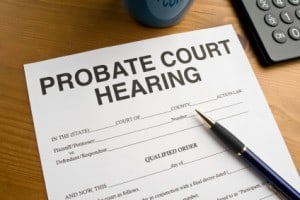“Though my job can be technical, I am sensitive to our clients’ grief and always want them to feel supported.”
—MELISSA AITKEN
Probate is a process that occurs when a person dies, and a court must dispose of the property of the decedent (person who passed away). The decedent may have certain debts against them and may have a will that directs where the court should distribute the property.
During the probate process, the Probate Court will take probate fees out of the estate and ensure that things like funeral expenses and estate administrator fees are paid. The Probate Court has broad powers to conduct the probate process, direct the conduct of the Personal Representative of an estate, and pass orders to administer the estate.
The probate process is almost always a necessary event after the death of a loved one. Depending on your estate plan, or lack thereof, the Trust and Probate Administration process can prove relatively short or unduly long. In either case, navigating the probate process requires specific knowledge and experience.
The probate and trust administration process can be complicated. There is typically a myriad of paperwork, financial accounts, insurance policies and retirement plans, and real and personal property to deal with. Paying special attention to beneficiary designations and how assets are titled is crucial.
No, some if not most of your property need not be subject to the probate process. Maryland law, for example, only recognizes certain assets as part of your estate for probate court. The “net estate” in probate court is made up “property of the decedent” or person who has died. Therefore, assets not solely and directly owned by the decedent are not probate assets. Generally, the less probate assets in an estate the less complicated the probate process, and there are various ways to avoid a lengthy probate process.

Foremost, probate happens during the emotionally difficult time following the death of a loved one. Mourning the loss of a family member and dealing with legal matters in Probate Court can prove both financially and emotionally taxing. Many additional issues can creep into the probate process and cause significant stress, such as:
Most of the time, proper estate planning can help avoid potential issues in probate. There are always planning strategies to minimize the probate process, however, the best way to avoid difficulty in the probate process is to plan for the event with your family. Dealing with potential issues now will save you and your family much stress and financial loss later.
Absent a Will or Trust, property titled in the decedent’s individual name will be settled under state intestacy laws. As the overseer of a decedent’s estate, the personal representative or trustee must perform and could include these duties:
Beneficiaries’ Right to Information. During probate, beneficiaries of a decedent’s estate may demand information from the executor. Information a beneficiary is entitled to includes what assets the estate holds, how much debt the estate needs to pay and which assets are being used or sold to settle that debt.
Altman & Associates will guide you through the probate process…or help you plan to avoid it altogether. The probate process often has a bad reputation, and you may have heard “horror stories” from friends or family who have gone through a difficult probate process. But the process need not be difficult for you and your family if you take preemptive action. To discuss how we can assist you with probate, contact us to schedule a consultation. We have offices conveniently in Columbia, Rockville, D.C., and Northern Virginia.
A comprehensive estate plan may save your family time and money. Although many people will interact with a probate court in their lifetime, most know little about how it works. Equipping yourself and loved ones with some basic knowledge about the Maryland probate process can help you determine how you would like your estate to be handled.
Know the Maryland probate process applied depends on the size of the estate. Small estates, generally those with total assets valued at $30,000 or less ($50,000 or less if passing to a surviving spouse), may have a simplified procedure. The value of the estate also determines the court fees assessed. In Maryland, probate fees range from $50 to more than $2,500. This is exclusive of attorney’s fees, which, again, will usually depend on the complexity and size of the estate.
Besides costs, probate also takes more time than other estate planning mechanisms, such as trusts. The average length of a trust administration is estimated to be four to six months, though it could be significantly longer for large, complex estates and those which have several creditors. It is also important to know that the probate process is not private. Once entered by the court, generally the entire estate proceeding becomes a public record.
The probate process begins when the decedent’s named representative files a Petition for Probate with the court. The court, called the Orphan’s Court in Maryland, will oversee the estate administration under the instructions in the decedent’s will. If a Marylander passes without a will, state law will determine how their assets will be distributed. Here, the rules the state will apply depend on marital status, whether the person has any children, the age of the children, and other factors.
Not all property will need to be probated. Only property solely owned by the decedent, with some exceptions, goes through the probate process. For example, if a husband and wife jointly own a house and the husband passes, the wife will usually retain ownership with no court’s intervention. And property which is “payable on death,” such as life insurance policies or retirement funds, will automatically pass to the designated beneficiary.
There are estate planning options available to you that may allow you to avoid the probate process even with solely owned assets. The most popular method is a trust, usually accompanied by a “pour-over will.” Essentially, a will “pours over” the decedent’s assets into the trust. A named trustee is then responsible for managing the trust’s assets and distributing them under its creator’s wishes.
Each family is different, requiring their own, personalized estate plan. The right choice for you will depend on your situation, including the complexity and size of your assets. No matter the size of your estate, you should have a plan in place.
While it is difficult to avoid probate in Maryland several legal instruments can streamline and simplify the process. The living trust is the most widely used of these tools. Through a living trust, you transfer ownership of your property to yourself as the trustee while you are living. You then name someone to replace you as trustee if death occurs. This is important for a few reasons, including:
Often, a will can complement your living trust. We may recommend a “pour-over will” which automatically transfers, or pours over, any leftover assets into your trust once you pass away. Helpfully, this avoids the problem of having to update your trust every time you obtain new property. After a thorough review of your individual situation and assets, our skilled attorneys can provide detailed advice on how a living trust might benefit you and your family. We will see your needs and wishes properly executed through your comprehensive estate plan.
How you title your real estate will also affect whether it needs to pass through probate court. For instance, you may own your home as a joint tenant with right of survivorship with your spouse or other heir. Here, the surviving joint tenant retains sole ownership of the property if the other’s death occurs. Since the decedent’s ownership in the property ended at their death, it is not considered part of their estate.
